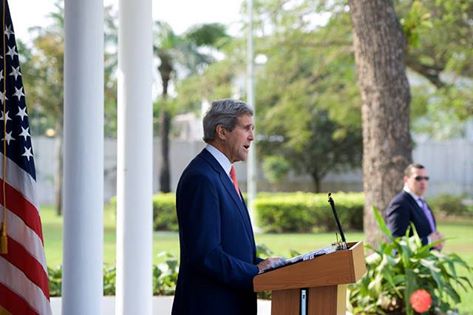US Secretary of State John Kerry on Friday pledged expanded economic and security support for Tunisia to help it cement democratic gains made since its revolution heralded the dawn of the 2011 Arab Spring.
Kerry was not specific but said the US and Tunisia would soon begin negotiations on a major loan guarantee and were discussing expanded military cooperation, including intelligence sharing and the possible use of drones to collect information about potential threats. A US military team will travel to Tunisia in two weeks to begin those talks, Kerry said.
“The eyes of the world are on Tunisia and America wants Tunisia to succeed,” Kerry told reporters at a news conference with Tunisian Foreign Minister Taib Baccouche. “The United States will continue to support the Tunisian people as they chart their way forward.”
Baccouche said Tunisia is “satisfied with its bilateral cooperation” with the U.S. and pledged to do more to stop illegal arms flows from Libya crossing into Tunisia.
Tunisia was the first of the Arab Spring countries to topple its authoritarian leader and is the only one to have made significant democratic progress since.
Despite that, Tunisia faces major economic and security challenges, notably after two large terrorist attacks this year — on the National Bardo Museum in Tunis in March and the Sousse beach resort in June — severely damaged its tourism sector. Tunisia depends on tourism for about 20 percent of its economic output and officials say it will take two or three years to recover. At the same time, Tunisia is concerned about the advance of Islamic State group militants in Libya.
Tunisia has already received $700 million in US assistance since 2011 and is now seeking a $500 million loan guarantee.
In addition to seeing senior Tunisian officials, Kerry met with members of the National Dialogue Quartet, which won this year’s Nobel Peace Prize for negotiations that carried the country through a constitutional crisis.
The four civil society groups — the main labor union, the bar association, the employers’ association and the human rights league — stepped into the crisis in 2013 and, working together, they got Islamists to agree to resign in favor of a caretaker government that would organize new elections, while the angry opposition returned to the table to complete the country’s constitution.
“That is recognition that every Tunisian should be very proud of,” Kerry said. Later, he added: “We have high hopes that Tunisia will continue down this path of compromise reconciliation and working together.”
Tunisia’s revolution was sparked by the self-immolation of a young itinerant fruit seller after he was harassed by police. It happened against a backdrop of high unemployment and economic troubles that have yet to be solved by the new elected government.
Many Tunisians complain that the revolution and democracy have brought them little improvements despite an increased freedom of expression, and young people in particular stayed away from the last election in droves. Despite its small size, Tunisia provides the most foreign recruits to the armies of the Islamic State group, with estimates of more than 3,000 having left to fight in Syria, Iraq and Libya.
Lufthansa, which says it needs to cut costs to compete with budget rivals and leaner Gulf carriers, has said it is open to mediation, provided the union calls off the strikes.
The union plans to end the week of strikes by calling on all Lufthansa Group employees to join a demonstration at Frankfurt airport on Friday from midday, Baublies told Reuters.
“If there is no movement from management then maybe we will have to say that there will be more strikes,” Baublies said.
Lufthansa has condemned the strikes as counterproductive.
“With this strike, they’re only making it harder for us all,” Bettina Volkens, head of personnel, said in an interview with daily newspaper Bild. “The only ones that are happy about the situation are our rivals


